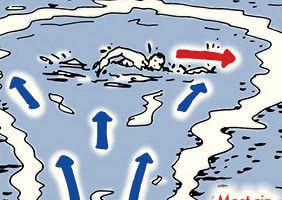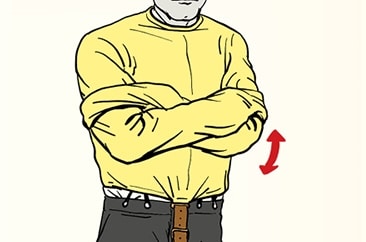
Editor’s note: The following excerpt on preparing to escape a prisoner of war camp was taken from FM 21-76: Survival, an Army field manual published in 1957. Noting that “because the conditions in various POW camps differ, it is impossible to provide a specific survival plan for each situation,” the text doesn’t include tips for digging a tunnel or jumping your motorcycle over fences, I’m afraid. The information instead lays out a plan for how “keep yourself physically able and sufficiently equipped for the breakout.” While it’s very unlikely you’ll ever find yourself captured as a prisoner of war, the section is an interesting read from an historical perspective, and offers some real-life inspiration on “mak[ing] the best of what you have.”
Suppose You’re Captured?
What happens if you become a prisoner of war? After all, it is possible. Isolation, fear, injury — all work in favor of the enemy to increase the chances of capture, in spite of a determined effort on your part to evade. The surrender of your arms, however, doesn’t mean that you forfeit your responsibilities as an American soldier. The Armed Forces Code of Conduct directs that you begin planning your escape the minute you are taken prisoner.
Escape is tough; making it stick is even tougher. It demands courage and cunning and much planning — of seeking ways out, routes to follow, and the location of friends. Above all, it demands physical stamina — stamina that you must acquire under the worst conditions imaginable. Experience has proved that “model” camps, where rations are regular and treatment considerate, are the exception. But no matter what extremes your life as a POW assumes, your aim should be the same — to keep yourself physically able and sufficiently equipped for the breakout.
A Plan for Survival
Since the conditions in various POW camps differ, it is impossible to provide a specific survival plan for each situation. What you need is a guide to help you plan to make the best of what you have. Here is one such plan that you can remember by the word S-A-T: Save, Add to, Take care of.
a. Save
What can you save in a POW camp? Everything — clothing, pieces of metal, cloth, paper, string — anything. A piece of twine may mean success or failure when it comes time to break out. Hide these items under the floor or in a hole in the ground. If they are discovered, they may appear harmless and little or nothing will be done to punish you.
(1) Wear as few clothes as possible. Save your shoes, underwear, shirts, jacket, and any other items of clothing that will protect you from the elements when you begin your trip back.
(2) Save any nonperishable foods that you receive from the Red Cross or your captors. Candy, for example, comes in handy as a quick source of energy when traveling. If no other candy source is available, save each issue of sugar given you by the enemy. When you get enough, boil it down into hard candy. Save it until you build up your supply. Canned foods that you might receive are ideal for storing. However, if the enemy punctures the cans to prevent your saving it, you may still preserve this food by resealing the cans with wax or some other field expedient. It may be feasible for you to save this food by recooking it and changing its form. Other foods to hoard against the day of your escape include suet and cooked meat, nuts, and bread.
(3) Save pieces of metal no matter how insignificant they may seem. Nails and pins can serve as buttons or fasteners. Old tin cans are excellent for improvised knives, cups or food containers. If you are fortunate enough to have a razor blade, guard it. Use it for shaving only. Devise ways of sharpening it — rub it on glass or stone or some other hard surface. A clean shave is a good morale booster.
(4) Save your strength but keep active. A walk around the compound or a few mild calisthenics keep your muscles toned. Sleep as much as you can. You won’t get much rest on your way back.
b. Add To
(1) Use your ingenuity. Select those items that you can’t get along without and supplement them; for example, your rations. There is more to eat, in and around your compound, than you think. When you are allowed to roam around the camp grounds, look for natural foods native to the area. If possible, add these roots, grasses, leaves, barks, and insects to your escape cache. They will keep you alive when the going gets tough.
(2) Supplement your clothing so the more durable garments are in good repair when you escape. A block of wood and a piece of cloth make good moccasins and save your boots. Rags can substitute for gloves; straw can be woven into hats. Don’t forget to salvage clothing from the dead.
c. Take Care Of
Probably the most important part of any plan for survival is the “take-care-of” phase. Maintain what you have. There won’t be any reissue when your shoes wear out or you lose your jacket. Also, it’s easier to maintain good health than to regain it once it’s lost.
(1) Put some of your clothing into your escape cache. Watch the rest for early signs of wear and repair it with improvised material, if necessary. A needle made from a thorn, nail, or splinter and threaded with unraveled cloth, can mend a torn pair of trousers. Wood canvas, or cardboard bound to the soles of your shoes will save them from wear. Even paper will suffice as a reinforcing insole if your shoes do wear through.
(2) Good physical health is essential to survival under any circumstances. It is especially important in a POW camp where living conditions are crowded and food and shelter inadequate. This means that you must use every device possible to keep yourself well.
(a) Soap and water is a basic preventative medicine; so keep clean. If water is scarce, collect rainwater, use dew, or simply rub yourself daily with a cloth or your bare hands. Pay attention to areas of your body that are susceptible to rash and fungus infection — between your toes, your crotch, and scalp.
(b) The cleanliness rule also applies to your clothing. Use soap and water when you can spare it. Hang your clothes in the sun to air if soap and water are not available. Examine the seams of your clothing and hairy portions of your body frequently for lice and their eggs. Disease infected lice can kill. A possible way to get laundry service or even a bath is to tell your guard that you are infested with lice, whether or not your complaint is true. The prison authorities, fearing that lice on prisoners may cause an outbreak of louse-borne disease among the civilian population, might provide this service.
(c) In the event you become ill, report your condition to the camp authorities. The chance that you will receive aid is worth the try.
Tags: Self-Defense & Fighting






